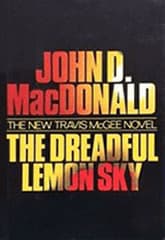The Dreadful Lemon Sky
Critique • Quotes
 First edition
First editionFirst publication
1975
Literature form
Novel
Genres
Crime, mystery
Writing language
English
Author's country
United States
Length
Approx. 74,000 words
Whatever floats your boat
Not sure why this Travis McGee story by John D. MacDonald is often picked out as one of his best. Yes, The Dreadful Lemon Sky is a pretty entertaining mystery in a certain laid-back modern American style. But the same can be said for most of MacDonald's work in the McGee series.
Perhaps it's the oddly intriguing title, containing a colour as all the McGee titles do but suggesting a greater psychological or philosophical depth, maybe something along the lines of an absurdist French tome.
Ten years and sixteen books into the series, we may be ready for our usually easy-come-easy-go protagonist to face an existential crisis. A little dread. Something like the weariness felt by Raymond Chandler's Philip Marlowe in The Long Goodbye, raising that crime story to another level.
But we don't really get much of that in The Dreadful Lemon Sky. (We don't really get it until the final McGee tale, The Lonely Silver Rain, another decade on.)
We do get a load of the usual McGee charm. Part of the appeal of the character (and the books) has got to be his anti-establishment attitude. He's a bit too old to be part of the 1960s and 1970s counterculture, but he nonetheless fits the tenor of those times. A veteran of some war in southeast Asia, he lives on a boat in Florida, works only as much as he has to, seems to have an easy-going approach to sex, lives for today, enjoys the party lifestyle and, although his favourite intoxicants are traditional, is not averse to those around him partaking in a little grass.
He's also an environmentalist (before environmentalism has become popular) and a cynical observer of society, especially of Floridian society. His comments on how his part of the world is being destroyed by greed and developers are pointed. One sample of his acidic commentary:
On the tube the local advertising for condominiums always shows the nifty communal features, such as swimming pool, putting green, sandy beach, being enjoyed by jolly hearted folk in their very early thirties. These are the same folks you see dancing in the moonlight aboard ships in the tour ads. These are the people who keep saying that if you've got your health, you don't need anything else. But when the condominiums are finished and peopled, and the speculator has taken his maximum slice of the tax-related profits and moved on to crud up somebody else's skyline, the inhabitants all seem to be on the frangible side of seventy, sitting in the sunlight, blinking like lizards, and wondering if these are indeed the golden years or if it is all a big sell, an inflation game that you have to play, wondering which you are going to run out of first, your money or your life. The developers leave enough to go wrong in each condominium apartment that it becomes an odds-on bet the money runs out first. Nursing homes are a big industry in sunny Florida.
Did I mention he is also quite funny? And not always at the expense of others, as he can be self-deprecating as well, especially over his relationship issues.
Long line of lovable rascals
Part of the attraction of the character is that he solves crimes without being a cop — public or private. He doesn't actually set out to solve crimes but rather considers himself a salvage expert of sorts, recovering lost things or missing people for a fee—sometimes for friends. A kind of do-gooder for hire. In this he resembles Robert B. Parker's more famous Boston-based character, Spenser. I would argue, however, the roots of both go back to a long line of good-hearted British rascals like the Saint and Raffles and further back to Robin Hood.
In The Dreadful Lemon Sky, a former lover shows up at McGee's houseboat with a suitcase containing about $100,000. She wants him to keep it for her, from which he can take $10,000. If she doesn't come back to get it, he's to give it to her sister. Of course, she is killed and McGee sets about to find the sister and incidentally solve the murder.
That's just the beginning of a wide-ranging, twisting and turning plot. Despite involving gruesome deaths, bombings and international drug dealers, the story somehow stays light-hearted. The writing is smart. All the characters, including secondary and tertiary figures, are memorably drawn. His regular friend Meyer, an economist like no other economist you're ever seen, is almost as intriguing a character as McGee himself. The action, when called for, is deliberate and carefully described, so you always know what's going on as much as McGee does.
In a throwback to older hardboiled writers like Chandler and Ross Macdonald (who should not be confused with John D.), the whole story is told from the first-person perspective of the main character. This is a relief when one tires of the convoluted plots with multiple points of view in more recent crime fiction. You don't have to juggle a dozen different storylines in hopes they'll all eventually come together. You can just inhabit Travis McGee's inquisitive mind for a few hours.
There's no great lesson to be learned there. It's just an interesting place to visit. And when the visit is over, it's over.
If you've enjoyed your stay, you can revisit with twenty other almost just-as-entertaining McGee novels.
— Eric
Critique • Quotes

